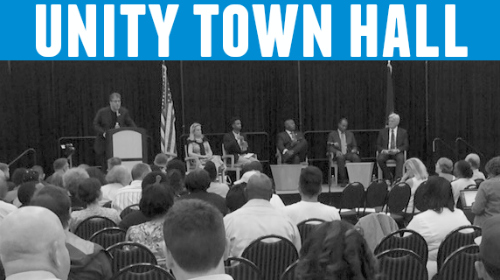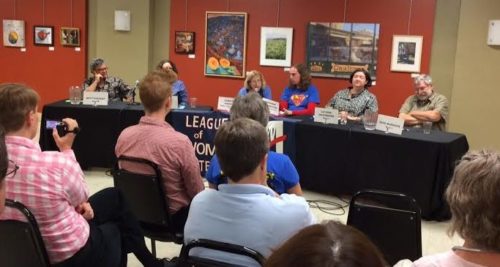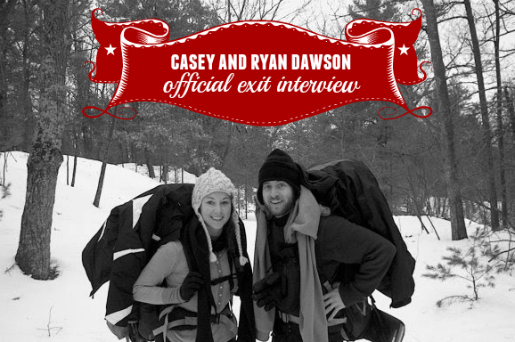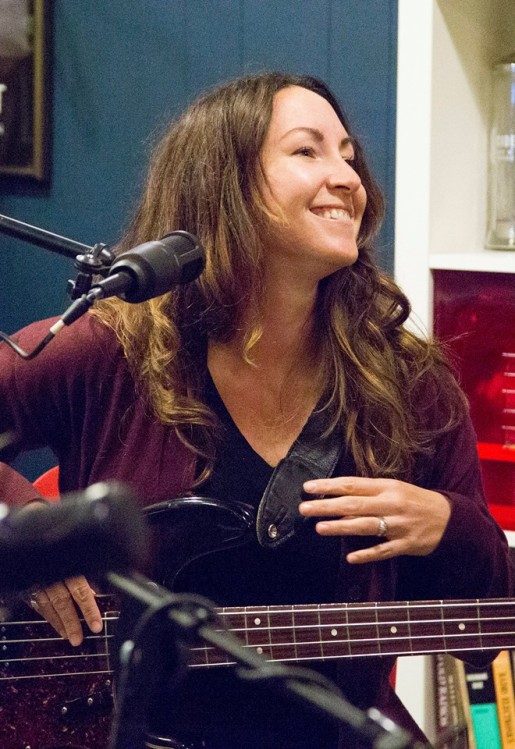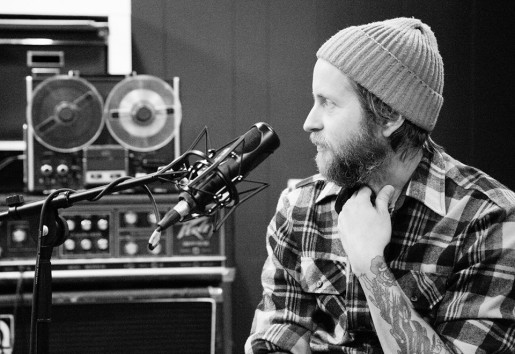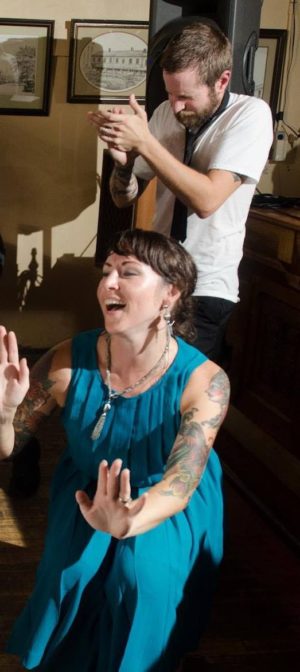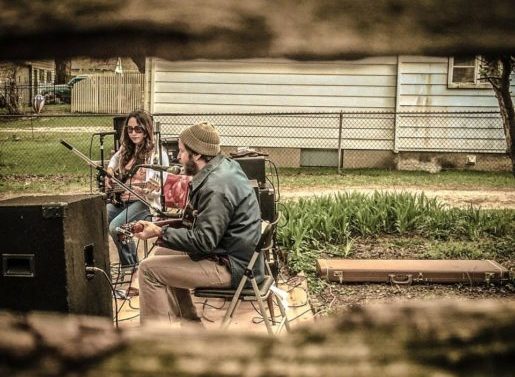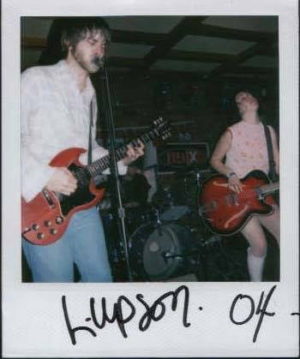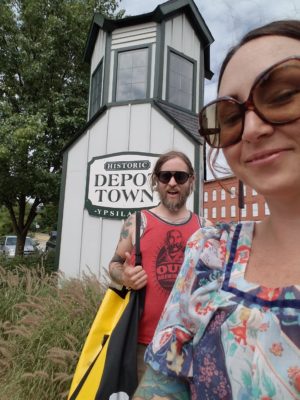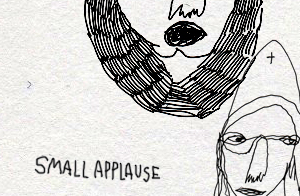This evening I attended the Unity Town Hall at Eastern Michigan Union, during which Congresswoman Debbie Dingell, Black Lives Matter Organizer Myles McGuire, Wahstenaw County Sheriff Jerry Clayton, Mark Fancher of the Michigan ACLU’s Racial Justice Project, and Washtenaw County Prosecutor Brian Mackie sat before an audience of about 250, responding to questions about civil rights, policing, and what actions are being taken across our community to ensure that no one dies needlessly at the hands of police in Washtenaw County. Following are six highlights.
1. In response to a question from the audience about how officers are trained to de-escalate situations, Clayton talks about how strategies are evolving. In the past, he says, officers were trained to resolve issues as quickly as possible and move on. Now, he says, they’re beginning to give people more space (which he refers to as “tactical repositioning”), and allowing for things to calm down. He also says that, starting in September, officers will be receiving a special two-day training in how to better interact with individuals who are mentally ill, under the influence of narcotics, or suffering from dementia. Fancher says that Clayton has the right idea, but then adds that what’s taught at the police academy, and in classes such as this, is often cast aside on the street, once new recruits are partnered with veterans who tell them that, in communities of color, they need to be rough and “establish control” if they want to survive. Clayton agrees that this can happen, but says that cultures can be changed when department leadership, from top to bottom, is in line, policies are clearly articulated, and unwanted behaviors are addressed.
2. Someone asks how things can change when police officers refuse to violate the “blue code,” call one another out for their behaviors, and demand accountability. Fancher says that’s the big question in all of this, adding that it should be on the police to clean this up, as they started all of this by killing innocent people. Clayton agrees that there needs to be more accountability from top to bottom. He also stresses that more than 90% of cops are essentially good. Asked how to fix the problem, Fancher says that so-called rogue cops need to be disciplined. “Police leadership cannot be intimidated by police unions,” he says. Furthermore, he says that we need to get to know the rank and file officers, and not just the same representatives of the police force that attend public events. Every local organization, he says, should invite beat cops in to talk. And these officers should be encouraged to change the “insular culture” within their departments. If officers hear things said by fellow officers that are inconsistent with the stated objectives of the department, Fancher says, they should be empowered to say something.
3. A student from Africa stood up and said that he’s lived here for two years, and that he’s scared. He didn’t know about racism before he came here, he said. “How should I live with fear?” he asked the members of the panel. “Help me understand what should I do.” After a short silence, and some discussion on the panel about how we all have to come together, Fancher said, “We’ve got no room for fear.” Black people, he told this young man, have conquered fear for generations. “Our ancestors would roll over in their graves if they heard that we were afraid after all that they went through,” he said, after noting the struggles of African Americans under slavery, and the threat of violence met by protestors during the civil rights era. “We stared down the barrels of guns with Dr. King without fear,” he said. Others on the panel echoed his sentiments.
4. Prosecutor Mackie was called out by several people. One man asked him directly, “How do black lives matter to you? And how do your practices reflect this?” Mackie responded by saying, “You’ve asked me many questions over the years” to the man who posed the question, to which the man responded, “And you haven’t answered any of them.” Mackie then responded that black lives matter to him because he cares about people, and that “black people are people.” He went on to say that he knows he isn’t much liked, but that prosecutors never are. While he clearly rubbed people the wrong way, he said several things over the course of the evening that I found noteworthy. First, he said that we’re at a period in American history when we have “an openly racist” candidate running for President, and that we need to look out for one another. Second, he told people that, while it’s true that a disproportionate number of those prosecuted by his office aren’t white, it’s also true that crime victims are disproportionately not white. He also noted that, “We are in the most violent state in the Midwest,” and added that 72% of murder victims during a recent year were African American. Third, he acknowledged that “things are not fair.” Public education, he said, is being systematically destroyed, and people, especially people of color, are finding that they have increasingly less economic opportunity in this country. And that, he says, “is going to lead to more participation in crime.” Furthermore, he said, not enough people were taking advantage of the educational opportunities that we do have. While we have Headstart and quality preschool available to everyone, he said, our attendance rates are abysmal, especially in kindergarten, which isn’t mandatory. Education should be mandatory, he said. “We need to educate everybody. That’s how we get better.” And, fourth, he acknowledged that we can do a better job both hiring prosecutors of color and getting juries that better reflect the demographics of our community. He says that finding prosecutors of color, however, is not an easy task, and that many who are called for jury duty don’t show up. On this same subject, he also said that the lists from which they select potential jurors are insufficient, and they need to find new ways to identify people, instead of just relying on tax records and utility bills. [Speaking of Mackie, he was asked directly about the killing of Aura Rosser by police in Ann Arbor and whether or not he had said that her killing was justified because she was mentally ill. He denied having said anything of the kind. The woman posing the question, however, insisted that he had. Another person in the audience said that his office had wrongfully accused two men of crimes that they did not commit. Others claimed that he had not responded to their inquiries concerning cases.]
5. With all of the additional duties we’re asking our police officers take on, a woman asks, how are you able to do it all? How can police officers be expected to know mental health, social work, and everything else, all while having their funding cut? (Mackie says that Washtenaw County at one point had over 600 officers, but now has roughly 500.) “The whole system is jacked up,” she says… In response, Clayton talks about increasing coordination with other entities. He notes a program in Seattle that gives officers the flexibility to hand off first-time non-violent drug offenders to case workers who can offer services in lieu of jail, and says he’d like to explore it here. This not only gets them the help they need, he says, but it keeps them out of the criminal justice system. Fancher says this is where the real potential is. While it’s good to get officers out of their cars and playing basketball with neighborhood kids, he says, this is the kind of thing that will lead to real, meaningful progress… getting officers working at the street level with professionals from different fields, creating a support ecosystem that actually works for citizens.
6. And there was talk about what people can do to lessen their chances of being killed by an officer during routine traffic stops. Clayton says at some point this would have been an easy thing for him to answer. Now, though, he says he’s not so sure. Saying, “I’m being honest with you,” he tells us what he’s told his three sons. Listen to the officers, and don’t make any sudden movements, he says. If you do that, he says, “Most times you’ll be ok.” “If I didn’t think that,” he adds, “I wouldn’t be in the profession.” He goes on to say, however, that it’s not 100%. There are bad cops, he says, and it’s difficult to tell them from the good ones. “You can’t guarantee that you’re going to walk away whole,” he says. “I’m just being honest with you,” he adds. A women in the audience says that, if an officer tries to stop her, she intends to drive to a well-lit public space before pulling over. She also says that she’ll likely call 911 and keep them on the line while she’s interacting with the officer. Fancher suggests that people in the audience may also want to download the ACLU’s Mobile Justice app, which you can use to stream video of your police encounter directly to the ACLU.
There was a lot more. There was a guy in the audience who yelled “All Lives Matter,” only to be told by McGuire that he sounded like someone running up to a firefighter trying to put out a house fire and saying, “All houses matter.” There was also the moment when, in a discussion about prison reform, Debbie Dingell said that we might have common cause with some on the right. After saying that she didn’t think she’d ever utter these words, Dingell said, “The Koch brothers can bring about real change.” And there was a short discussion about Citizen Oversight Committees. (Clayton says that his department has a Citizen Advisory Committee now, but that he has concerns about broad citizen oversight. When asked why, he mentions that, in some instances, they’ve led to terrible results that have required federal intervention.) And there were discussions about white guilt, gun control, any number of other things. If you were at the event and would like to add to my notes, please leave a comment. As I said at the outset, I know these notes of mine are insufficient, but I at least wanted to get the ball rolling.
[For those of you who would like to know more about the local conversations that are taking place regarding race and policing, I’d encourage you to also read about last week’s meeting of the Ypsilanti joint task force on police/community relations.]

